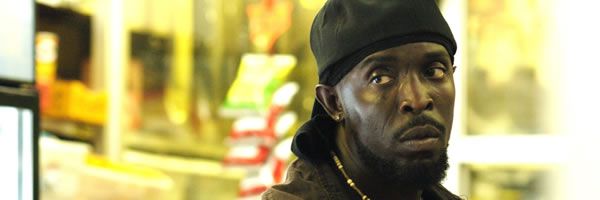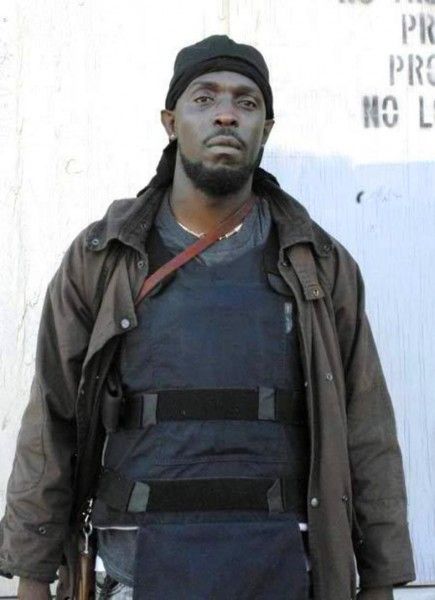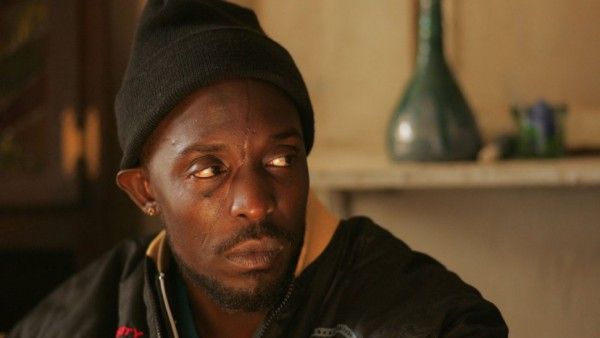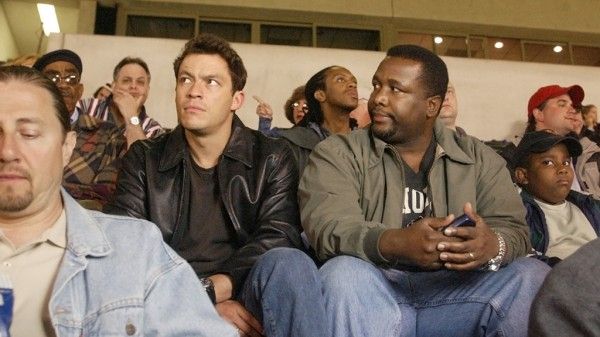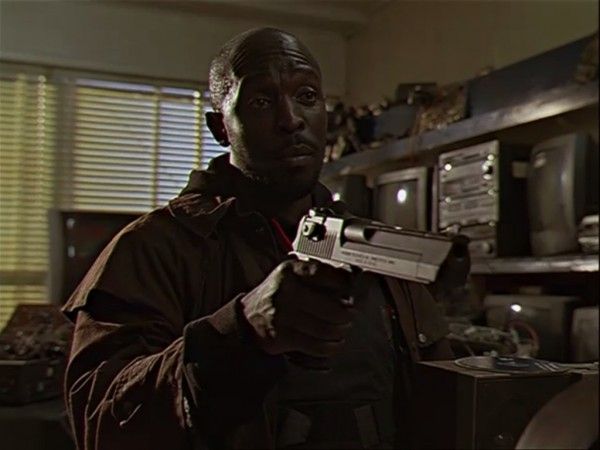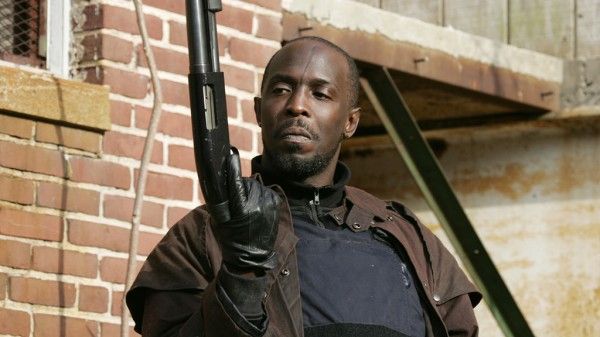The Wire is widely considered to be one of the best television shows ever made. Creator and showrunner David Simon used long-form storytelling over the course of five seasons to explore the complexities of city life in Baltimore ranging from crime, the working class, politics, education, and media, and seeing how all of these worlds intertwined into a fascinating and disheartening ecosystem.
While the show is filled with plenty of memorable characters, perhaps the most popular is Omar Little, a thief who robs drug dealers, and does with aplomb, charm, and skill, not to mention his charisma. It was a breakthrough role for actor Michael K. Williams, who has gone on to co-star in Boardwalk Empire, The Road, and most recently, Inherent Vice. With The Wire getting an HD re-release, I had the chance to speak to Williams about the show's return, why the series is more relevant than ever, what he looks for in a role, and much more. Hit the jump to check out the interview. A marathon of the remastered episodes of The Wire begins on HBO Signature on December 26th at 12pm. The show will also be available on HBO Go.
Collider: Now that The Wire is being re-released, it’s going to be introduced to a completely new audience. What do you hope that audience gets from this show?
MICHAEL K. WILLIAMS: I hope the audience walks away with a deeper understanding on what’s going on with our country—what’s wrong with our society and our social system, our judicial system, the way we treat each other. I would hope that it would bring empathy in different walks of life. With the The Wire a little bit, understanding what’s going on in the hood for people who don’t live in the hood.Â
The good thing about it being re-released is that when it was on HBO there really wasn’t any way to see it, unless you had HBO. Now that there are so many more ways to see it, do you think that it will have greater awareness and social consciousness now than it did back when it was originally on the air?
WILLIAMS: I think it will definitely have a bigger impact on social consciousness than it did back then, especially in regards to all that’s going on right now. I think it’s very shitty that we watch this and try to come up with some answers to these problems that we’re having.
Absolutely.  That’s one of the frustrating things. The show has been off the air for almost a decade and yet, it could’ve come out a year ago.
WILLIAMS: It’d still be just as relevant. We’re facing a lot of the same issues that the show shined a light on. I would hope that people would maybe try to come up with some solutions as a nation and that we could figure out how to not have The Wire still be so relevant right now.
Have you ever spoke with David Simon about him continuing the show because it always felt like there was a new area of Baltimore to explore.
WILLIAMS: I think David ended the show right when it was supposed to end. I think it was he who said, “Enough.â€Â I think he said just enough to engage conversation and hopefully invoke change.
It was fitting for him, coming from writing a newspaper, to end the series with that sort of overview.
WILLIAMS: Yeah, yeah. That was right. My personal favorite was Season 4 with the kids.Â
I know a lot of people who say that season wrecks them. It’s watching a journey.
WILLIAMS:Â Yeah.Â
Omar has such a great arc over the series. What were your thoughts about it? And in particular, the conclusion of his story.
WILLIAMS: I love Omar, he’s one of my favorite characters of my career. His arc was sad because it was almost a person that could have gotten away. That’s what hurt me the most about Omar on being murdered the way he was. He had so much potential, he had an opportunity to change his life and to see what impact he could’ve had on society. Although it hurts to see a child killed, it rings true to me. That’s the average kid on the street, they’ll blow your head off in a minute, life is cheap on streets. That’s the truth, that’s what’s happening. It was very fitting, as harsh as it was, that’s just what it is.
It’s an incredibly powerful moment. What was your reaction when Barack Obama said The Wire was his favorite show and Omar was his favorite character?
WILLIAMS: My reaction was, “Wow!â€Â It made me have a whole new found respect for President Obama. It was one of the first times I felt like a President was really seeing and paying attention to what was going on in my community. I always felt detached of former—the Presidency. It might have been my paranoia, I don’t know, but that was the first time that, to me, a President said, “I see. Not because of the acting or because it’s a good TV show. I see you.â€Â He saw what was going on in my community, and “I empathize with you,†that‘s what it felt like to me. That was my reaction, “Oh, Wow! The President of the United States is paying attention to what’s going on in my streets.â€
I think that’s a testament to the power of the show, that it can reach so far and painted such a vivid portrait. The social consciousness of the wire, is that something that you continue to look for in future projects?
WILLIAMS: I look for just good writing. The Wire was The Wire. Bottom line is, I look for good writing.Â
Omar was such a popular, compelling character. Were you worried about getting typecast in that charismatic, criminal role that didn’t have the same depth as what The Wire provided?
WILLIAMS: No, that wasn’t I just stayed working consistently. I’d be acting, get typecast. If I put on my Omar then yes, I’m typecast. I’m looking for diversity, all my characters may or may not be on the wrong side of the tracks. It doesn’t mean that they’re all the same.
Outside of Omar, do you have a role you particularly love playing?
WILLIAMS: I think, with John Hillcoat, called The Road. I’m good with all my roles, I’ve never had a bad role. I enjoy my characters but that was a favorite, I think that’s the question.
Something I found fascinating is that you started at a dancer. I don’t think that’s something many people know about you. If you were offered a role in a Step Up franchise or some other dance-based film, would you consider taking it?
WILLIAMS:Â Absolutely, if the part is right, if the writing was decent and the character felt like a real person. Absolutely.
Is dancing something you miss doing in performance?
WILLIAMS: Yeah, music’s been part of my entire life. It’s in my DNA. I absolutely miss dancing. Don’t want to do it for a living, I’m getting old, I can’t move like I used to. If I had the opportunity to do something on Broadway or a musical, I would jump at the opportunity.
You had The Wire and then you had Boardwalk Empire. What were those experiences like, getting to build a character and layer them over the course of many seasons?
WILLIAMS: It was life changing. Those characters helped me with a strong form of foundation with those two characters. I have a very healthy appetite for good writing and good characters. Having weak writing is my biggest fear because everything is not going to be The Wire or Boardwalk Empire. I’d still like to be able to find that excitement in my work. I can do my best, I don’t want to do backwards, in that sense. Not think, “I want to do more Wires, I want to do more Boardwalks.â€Â
You play a character in a movie and then you play a character over years. How does that feeling end when you’re done with a movie as opposed to, you’re done with a TV series you’ve been on for many seasons?
WILLIAMS:  Ending a television character that you’ve been, especially someone like Omar Little, it hurts. For me, it’s a huge thing. You feel like a part of you is gone. For me, my past characters been hard, the way they died, being murdered, the sadness that goes around, the death. It’s a very hard thing to do. For me it was, it’s not very easy. For the film, you get the whole script, so you can see how your character’s gonna die and you know the whole script. With the TV series, it goes on for years. You get the script, or you get your dressing, multiple decor of your costume, “This shit’s not gonna go right. It’s about to go down.â€Â It’s different. This thing is a little bit more intense. You have to put your character to rest after x amount of years.
When you’re working on a film or TV series, are you someone who likes to talk with the filmmaker or the writer and get a better idea of where your character’s going, the creator’s thought process, and try to come to a common ground on that?
WILLIAMS: I stay off that end. My job is to bring to life the character, not to put the words on the paper.
The Wire being remastered, which brings it to a larger audience but then they’re also changing the aspect ratio, and David Simon’s trying to make the best out of a bad situation. Do you have any thoughts on this artistic change, but also opens up new exhibition for the movie?
WILLIAMS: No. I don’t know what to say about that. David is not crazy about that, I could only imagine. I just hope, from my aspect, that it doesn’t affect the performance and hope that all the people walk away with the same intent, emotion they did.  I, as far as creating the look on it, I’d have to see it.Â
Do you have any other favorite character on The Wire, other than Omar?
WILLIAMS:Â Bubbles.
For more on The Wire, here are my reviews of all five seasons:

